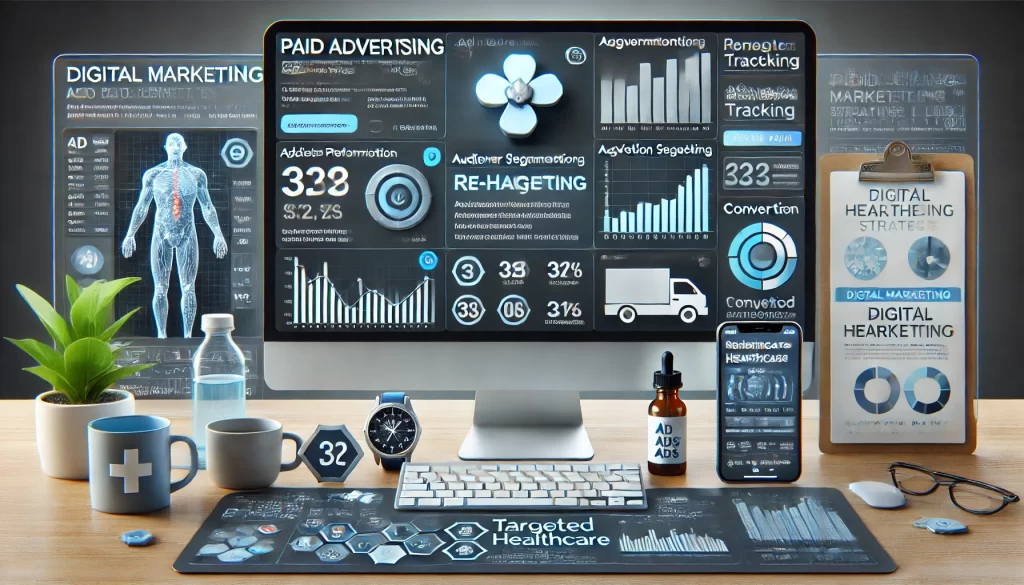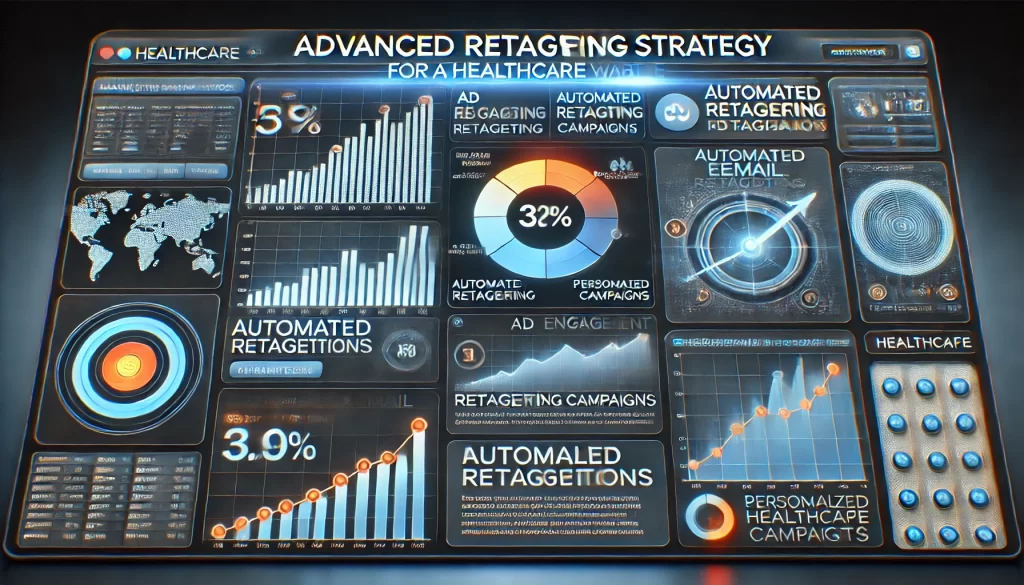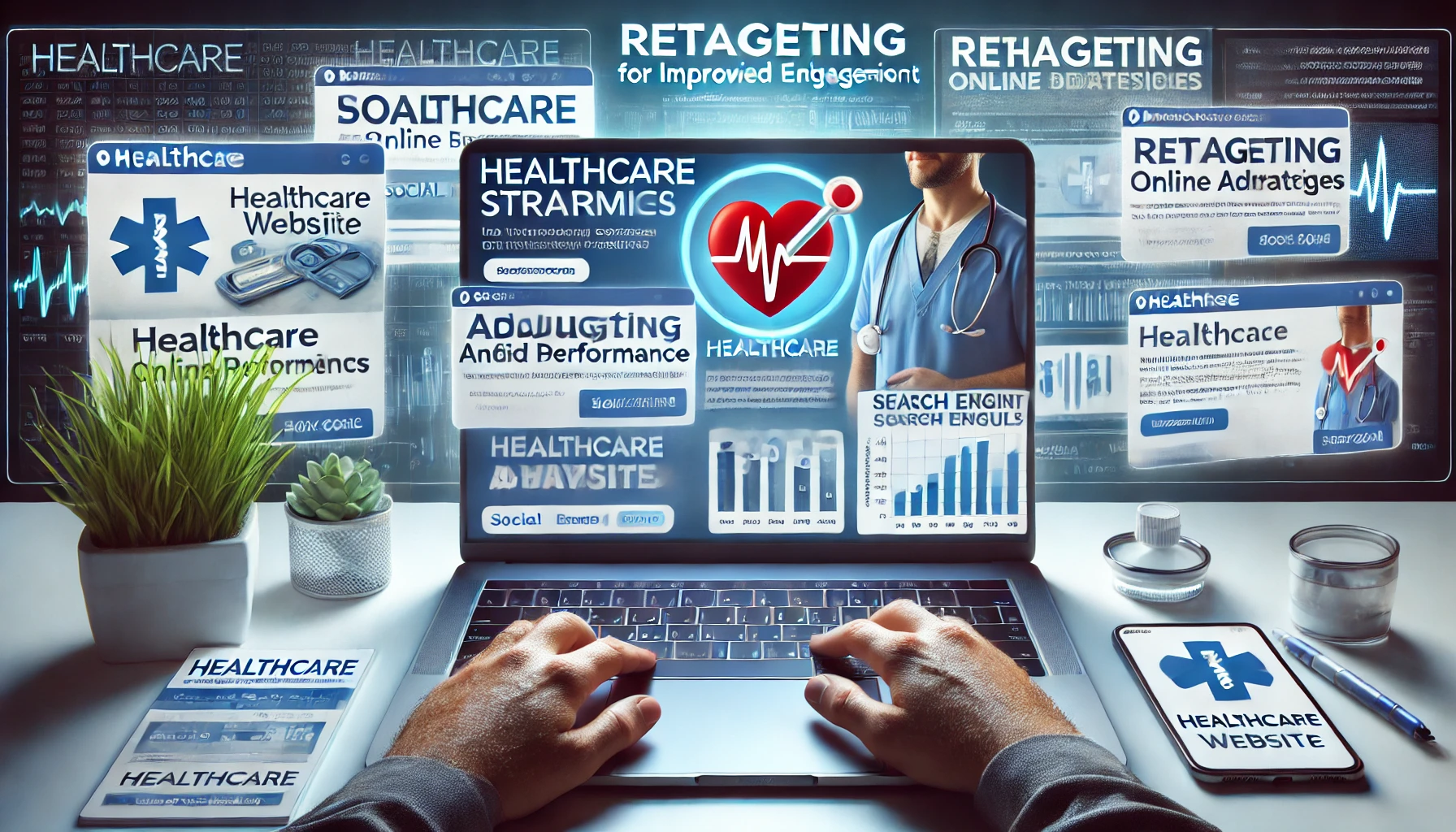Introduction
In the fast-paced digital world, paid advertising and retargeting have become essential tools for healthcare websites aiming to increase visibility, attract potential patients, and boost conversions. Whether you’re a mental health professional, a wellness coach, or a healthcare provider, leveraging platforms like Google Ads, Facebook Ads, and remarketing strategies can elevate your digital marketing efforts and ensure your services are seen by the right people.
However, paid advertising can be overwhelming. Understanding how to craft effective PPC campaigns and properly utilize retargeting tactics can make all the difference in driving traffic and meaningful conversions. In this article, we’ll explore actionable strategies and real-world examples for integrating paid advertising and retargeting into your healthcare website’s marketing plan.

Related Posts
- Alternative and Natural Health Websites
- Email Marketing for Healthcare Professionals
- Website Design for Specific Healthcare Niches
PPC Campaigns for Healthcare Professionals
What are PPC Campaigns and How Do They Work?
Pay-per-click (PPC) advertising is a model where advertisers pay each time a user clicks on their ad. It’s one of the most powerful ways to drive targeted traffic to your healthcare website, whether you’re promoting mental health services, physical therapy, or holistic wellness treatments.
With PPC campaigns for healthcare professionals, you’re essentially buying visibility on platforms like Google, Bing, or social media. In the context of healthcare, this allows you to get in front of potential patients who are actively searching for services like yours.
Why PPC Is Crucial for Healthcare Websites
- Immediate Visibility: With organic SEO efforts taking time to show results, PPC campaigns can offer immediate visibility for your healthcare business. Whether it’s Google Ads for healthcare or paid Facebook campaigns, your website can appear at the top of search results or in user feeds right away.
- Highly Targeted Ads: Unlike traditional forms of advertising, PPC lets you narrow down your audience based on demographics, behaviors, and interests. This makes it particularly effective for digital marketing for mental health professionals who need to connect with specific groups such as individuals searching for therapy, counseling, or mental wellness programs.
- Cost-Effective: PPC campaigns allow you to set a budget and bid for specific keywords, ensuring you don’t overspend. For healthcare websites, this can be particularly beneficial, allowing you to control your marketing spend while reaching the most relevant audience.
Creating an Effective Healthcare PPC Campaign
To get started with PPC advertising for healthcare, here are a few steps you can follow:
- Keyword Research: Identify the keywords that potential patients are likely to search for. For example, if you offer mental health services, target keywords like “mental health counseling near me” or “best therapy services in [location]”.
- Ad Copywriting: Write clear, compelling ad copy that speaks to the pain points and needs of your audience. For example, use emotionally resonant language like “Find compassionate care for your mental health” or “Get the support you need today”.
- Landing Pages: Ensure your ads link to a landing page that’s relevant to the ad. For instance, if the ad is about mental health counseling, the landing page should focus on that specific service, featuring detailed information and a strong call-to-action (CTA).
- Ad Extensions: Use ad extensions to include additional information like phone numbers, location, or links to specific service pages. This increases the visibility of your ads and makes it easier for potential patients to get in touch.

Google Ads, Facebook Ads, and Remarketing Strategies
Google Ads for Healthcare
Google Ads is one of the most effective platforms for healthcare providers to run PPC campaigns. It enables healthcare websites to appear at the top of search results when users search for relevant keywords. For example, a person searching for “best chiropractor near me” could see your Google Ad for chiropractic services in their local area.
Best Practices for Google Ads in Healthcare
- Target Specific Keywords: Focus on high-intent keywords that indicate a user is actively seeking healthcare services. Keywords like “urgent care near me,” “mental health therapists,” and “holistic health services” are all highly targeted terms that can drive relevant traffic to your website.
- Location Targeting: Healthcare is often localized, and patients typically look for services close to home. Ensure that your Google Ads campaigns are geographically targeted to attract users within your service area.
- Call Extensions: Healthcare patients often need to contact you immediately. Adding call extensions to your Google Ads allows users to click a button and call your office directly from the search results, which can significantly increase the conversion rate for phone consultations or appointment bookings.
Facebook Ads for Healthcare Websites
Facebook is another powerful platform for healthcare marketing. Unlike Google Ads, which targets people actively searching for services, Facebook Ads allows you to target potential patients based on their interests, behaviors, and demographic data.
Related Posts
- Key Features of Health and Wellness Websites
- Integrating Wellness Services
- Fitness and Wellness Websites: Design and Content
Targeting Strategies for Facebook Ads
- Interest Targeting: With Facebook Ads, you can target users who have shown an interest in health and wellness topics, mental health, fitness, or specific medical conditions. For example, if you offer mental health counseling, you can target people who have engaged with content related to anxiety, depression, or stress management.
- Custom Audiences: Facebook allows you to create Custom Audiences, which lets you target users who have already visited your website, engaged with your content, or even interacted with your previous Facebook ads. This is an essential tool for retargeting users who may not have converted the first time around.
- Lead Generation Ads: Facebook offers the option to create lead generation ads where users can directly sign up for newsletters, consultations, or book appointments without leaving the platform. This is ideal for healthcare providers looking to gather information from potential patients and follow up later.
Remarketing Strategies – Bringing Back Interested Visitors
Remarketing, also known as retargeting, is a powerful strategy for bringing visitors back to your healthcare website. It involves displaying targeted ads to users who have previously visited your website but did not convert, whether that means booking an appointment, signing up for a consultation, or completing a contact form.
How Remarketing Works
Remarketing works by placing cookies on your website visitors’ browsers. When they leave your site, they will start seeing ads related to the services they previously viewed. For instance, if someone visits your mental health services page but left without booking an appointment, they will start seeing ads for your services again as they browse other sites.
Setting Up Remarketing Campaigns
- Segment Your Audience: Not all visitors are the same. Segment your audience based on their interactions with your website. For example, those who visited your booking page but didn’t complete the process might receive ads reminding them to finalize their appointment.
- Create Compelling Ads: Use ads that offer a gentle reminder or provide an incentive, like a special discount for a first appointment or a free consultation. The goal is to encourage them to return to your site and complete the action they initially intended.
- Use Dynamic Remarketing: For healthcare services, dynamic remarketing can be particularly effective. This allows you to display ads featuring the exact services a user previously viewed. For example, if someone viewed your chiropractic services, they will see ads for that specific treatment when they browse other websites.
FAQs
What is paid advertising for healthcare websites?
Paid advertising for healthcare websites involves running ads on platforms like Google and Facebook to drive targeted traffic to your website. It allows healthcare providers to increase visibility and attract patients through paid campaigns.
What is remarketing and how can it help my healthcare website?
Remarketing is a strategy that targets users who have visited your website but didn’t convert. By displaying targeted ads to these users as they browse other sites, you can encourage them to return and complete an action, such as booking an appointment.
How can Facebook Ads help my healthcare website?
Facebook Ads allow healthcare providers to target users based on interests, behaviors, and demographics. It’s especially useful for healthcare businesses looking to engage with potential patients through highly targeted ads.
What are the best PPC platforms for healthcare websites?
Google Ads and Facebook Ads are two of the most effective platforms for healthcare websites. Google Ads is excellent for capturing high-intent searches, while Facebook Ads provides powerful targeting options based on interests and demographics.
Key Takeaways
Paid advertising and retargeting are crucial components of an effective digital marketing strategy for healthcare websites. By leveraging platforms like Google Ads and Facebook Ads, healthcare providers can increase visibility and attract a targeted audience. Additionally, remarketing strategies allow you to re-engage users who’ve already shown interest in your services, increasing the chances of conversion. With the right approach, healthcare websites can maximize their marketing ROI and drive more patients through their doors.
- PPC campaigns allow healthcare providers to gain immediate visibility and drive highly targeted traffic to their websites.
- Google Ads and Facebook Ads are powerful tools for attracting new patients, with Google Ads excelling in capturing search intent and Facebook Ads offering advanced targeting options.
- Remarketing is an effective way to bring back visitors who did not convert, increasing the likelihood of successful conversions.
Effective paid advertising strategies can help healthcare professionals grow their online presence, improve patient engagement, and ultimately increase their patient base.
